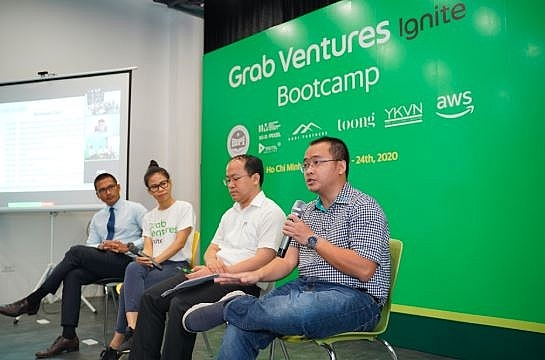Vietnamese startups still raise millions of US dollar during the pandemic
| Two Vietnamese start-up winners for 2020 Asia-Pacific Low Carbon Lifestyles Challenge | |
| Vietnam’s start-up landscape attractive to Korean investors | |
| Youngsters take part in start-up festival in Da Nang |
 |
| Discussion in Vietnam's startup ecosystem at the Grab Ventures Ignite Bootcamp. Photo: VIR |
According to data compiled by Singapore-based DealStreetAsia, Vietnam witnessed a significant pickup in fundraising activities by way of deal count and value in the second quarter of 2020.
Specifically, Tiki wrapped up a $130 million investment from private equity fund Northstar Group, making the e-commerce operator one of the top five funded startups in Southeast Asia in the period.
Similarly, e-commerce solution company OnPoint has raised $8 million from South Korean, Japanese, and Vietnamese investors in its Series A funding. Meanwhile, Sapo, a multichannel management and sales platform, successfully raised funds from Smilegate Investment (South Korea) and Teko Ventures (Vietnam) to officially launch its additional port with the Tiki e-commerce platform.
Vietnamese online recruitment company Transcendental Human Resources JSC received $34 million from Affirma Capital to expand its market share and build up its value-added services. Elsewhere, Vietnamese cinema chain Beta Media also received $8 million from Japanese private equity firm Daiwa PI Partners to accelerate its franchise business model.
Commenting on this trend, Grab Vietnam managing director Nguyen Thai Hai Van said that the country is now a prospective investment hub for foreign investors, with the highest internet and smartphone penetration across the region. The talent pool in Vietnam is also young and resilient, increasingly educated with a growth mentality, and is more ready to adopt new tech and innovation.
In terms of public policy, Vietnam has largely returned to normal and is making every effort to get the economy back on track during COVID-19, which has been a positive sign to the startup ecosystem. Thus, investors looking for a market in the region to invest in startups can still be attracted to Vietnam, Van said.
She added that the pandemic has put unprecedented pressure on many startups, however, startups can win if they embrace changes. As an example, Grab recently kicked off Grab Ventures Ignite, an accelerator programme for early-stage startups in Vietnam with a focus on helping domestic startups thrive in the new normal.
Tran Hai Linh, CEO of e-commerce platform Sendo, said much investment was drawn to nations in Southeast Asia several years ago, with Indonesia a big winner due to its well-generated economy and young population. Now, with an eager-to-learn generation, a fast-growing economy, and effective reactions from the government to the health crisis, the Vietnamese market can become the next attractive destination for investment in the next few years.
Linh noted that most Vietnamese startups are raising funds between $1-10 million, with local incubators and Series A funds remaining quite active in the country despite the global issues. However, due to disruptions due to coronavirus, Vietnamese startups will need to wait from six months to a year to receive larger funds from overseas investors.
“To grab the opportunity, startups should step up and try new things. The key ability for them to win is to create a unique point. No success can be achieved by copying. Startups in Vietnam can exploit new fields which nobody has done before to be the next disruption to succeed,” Linh added.
There continues to be immense long-term potential for Vietnam tech, both for companies serving the domestic market as well as beyond. The US-headquartered venture capital firm and incubator 500 Startups invested in 19 new companies in 2019. It aims to reach the target of 80 companies invested cumulatively by early 2021.
Eddie Thai, partner at 500 Startups, told VIR that the increase in investment activity was the natural result of Vietnam’s maturing ecosystem. “For any digital economy, the first wave of successful companies would be in media, e-commerce, and payments. So it’s only natural that such companies would have reached sufficient scale to receive tens or hundreds of millions of dollars of investment,” he said.
Indeed, a substantial portion of the money invested last year went to e-commerce players Tiki and Sendo and payments players Momo and VNPay.
However, Thai pointed out a couple of short-term risks for Vietnamese startups. “First, obviously, there is economic risk due to COVID-19. Although Vietnam is doing a pretty good job of keeping people safe so far, it will still suffer major economic effects in the form of less trade, less tourism, less domestic consumption, and more,” he said. “Many tech startups will be affected by this as well. In addition, there is also a more direct impact of the virus: international investors have been cancelling or delaying trips to Vietnam. This means financing will be lower in the near term.”
 | Vietnamese start-ups go global Nguyễn Hữu Tuất launched a Vietnamese ride-hailing firm a year ago, with dreams of scaling up the business overseas. |
 | RoK investors offer huge opportunities for Vietnamese startups Vietnamese startups are expected to have more opportunities to receive investment and support from Korean investors, who are coming in droves in Vietnam, experts have ... |
 | Tourism expert finds misson to support Vietnamese start-ups When he was a child, a journey north to Canada from his home in Milwaukee was considered serious travelling to Jason Lusk. |










